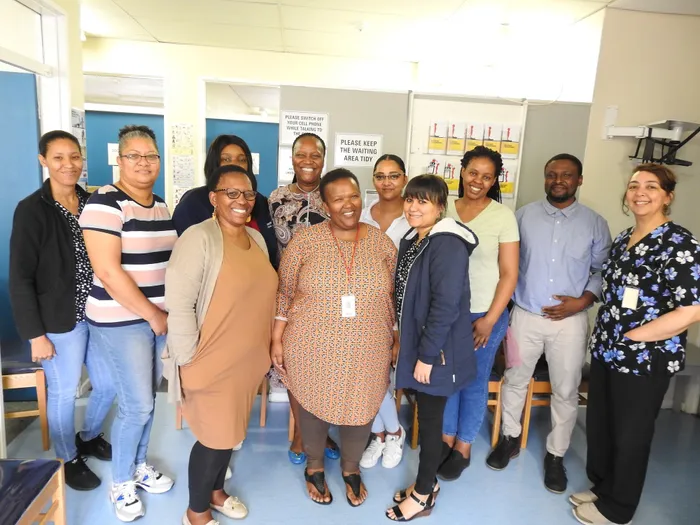Social workers fight to protect children’s rights

Social work staff at the Red Cross War Memorial Children’s Hospital, back, from left, are Erica Coetzee, Nicolette Collison, Thandokwazi Mzwakali, Noluthando Loleka, Tamsyn Arendse, Zintle Maya, Vuyolwethu Dlwati and Carla Brown. Front: Nolwazi Qebeyi, Primrose Phokojoe and Lizelle Jafta. Picture: supplied
“This profession is not for everyone; you need to have a passion for people and helping people when they are at their most vulnerable,” says Red Cross War Memorial Children’s Hospital social worker Lizelle Jafta.
With World Social Work Day on Tuesday March 21 several of the hospital’s social workers spoke about the challenges they face and the importance of promoting social work in health care.
Ms Jafta says social workers need to be willing to be the strong person, even “when you feel like you are about to fall apart”.
Zintle Moya, a social worker in the hospital trauma ward, says she did not want to pursue a career in social work at first.
“I thought the stresses and pressures of the job would be too much to cope with, so I opted for psychology instead because I knew I wanted to help people.”
But during the course of her studies, one of her lecturers, who was a social worker, inspired her to change her mind and go into social work.
Carla Brown, the head of the hospital’s social work department, says the department plays a key role in paediatric health.
“Paediatric medicine works hand in hand with social work as without a supportive and well-functioning home environment, a child’s health cannot be successfully managed, and the treatment process can be jeopardised.”
For example, she says, the social circumstances of a child in need of a renal transplant must be adequate to support the prescribed treatment, and if the child is not being cared for adequately, a social worker will be asked to step in to ensure this happens.
According to Ms Brown, the department sees about 25 walk-in cases a day. “These cases include extreme poverty, illicit drug and alcohol addiction, and issues of violence. We cannot solve these issues on our own and sometimes we cannot do more to help a family,” she says.
Another social worker at the hospital, Noluthando Loleka, says, “We don’t only have to manage complex cases, we sometimes must accept that there is nothing more that we can do, due to the patient’s lack of basic resources such as food.”
It can be heartbreaking, she adds, having to sit opposite a desperate grandmother who needs to administer chronic medication to a grandchild but can’t do so because she doesn't know when his next meal will be.
Ms Brown says the public can help social workers in several ways:
• Report abuse or neglect of children the moment you witness it. Early reporting prevents later catastrophes for children. Early intervention is paramount.
• Report gender-based violence in a household as well as drug abuse and alcohol abuse by parents or child minders. No child deserves to be a witness to and victim of these social problems.
• Change the public perception of social workers – social workers do not remove children unless a court finds a child in need of care and protection.